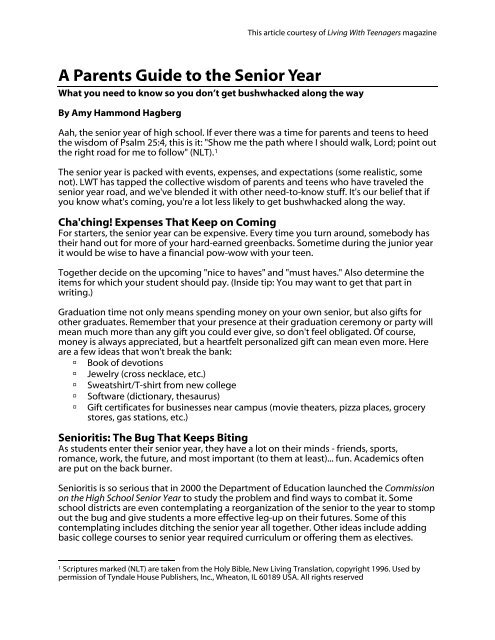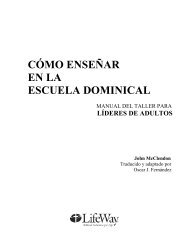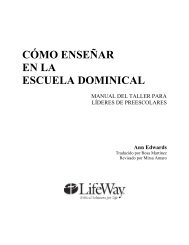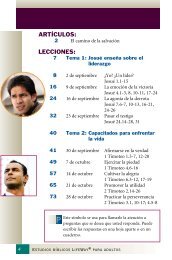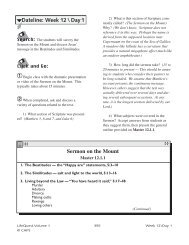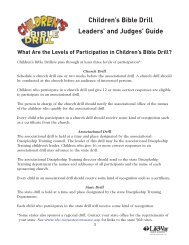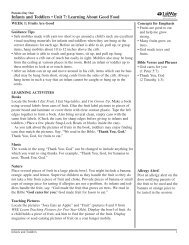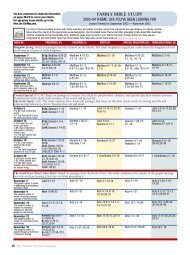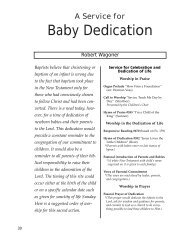A Parents Guide to the Senior Year - LifeWay
A Parents Guide to the Senior Year - LifeWay
A Parents Guide to the Senior Year - LifeWay
You also want an ePaper? Increase the reach of your titles
YUMPU automatically turns print PDFs into web optimized ePapers that Google loves.
This article courtesy of Living With Teenagers magazine<br />
A <strong>Parents</strong> <strong>Guide</strong> <strong>to</strong> <strong>the</strong> <strong>Senior</strong> <strong>Year</strong><br />
What you need <strong>to</strong> know so you don’t get bushwhacked along <strong>the</strong> way<br />
By Amy Hammond Hagberg<br />
Aah, <strong>the</strong> senior year of high school. If ever <strong>the</strong>re was a time for parents and teens <strong>to</strong> heed<br />
<strong>the</strong> wisdom of Psalm 25:4, this is it: "Show me <strong>the</strong> path where I should walk, Lord; point out<br />
<strong>the</strong> right road for me <strong>to</strong> follow" (NLT). 1<br />
The senior year is packed with events, expenses, and expectations (some realistic, some<br />
not). LWT has tapped <strong>the</strong> collective wisdom of parents and teens who have traveled <strong>the</strong><br />
senior year road, and we've blended it with o<strong>the</strong>r need-<strong>to</strong>-know stuff. It's our belief that if<br />
you know what's coming, you're a lot less likely <strong>to</strong> get bushwhacked along <strong>the</strong> way.<br />
Cha'ching! Expenses That Keep on Coming<br />
For starters, <strong>the</strong> senior year can be expensive. Every time you turn around, somebody has<br />
<strong>the</strong>ir hand out for more of your hard-earned greenbacks. Sometime during <strong>the</strong> junior year<br />
it would be wise <strong>to</strong> have a financial pow-wow with your teen.<br />
Toge<strong>the</strong>r decide on <strong>the</strong> upcoming "nice <strong>to</strong> haves" and "must haves." Also determine <strong>the</strong><br />
items for which your student should pay. (Inside tip: You may want <strong>to</strong> get that part in<br />
writing.)<br />
Graduation time not only means spending money on your own senior, but also gifts for<br />
o<strong>the</strong>r graduates. Remember that your presence at <strong>the</strong>ir graduation ceremony or party will<br />
mean much more than any gift you could ever give, so don't feel obligated. Of course,<br />
money is always appreciated, but a heartfelt personalized gift can mean even more. Here<br />
are a few ideas that won't break <strong>the</strong> bank:<br />
Book of devotions<br />
Jewelry (cross necklace, etc.)<br />
Sweatshirt/T-shirt from new college<br />
<br />
<br />
Software (dictionary, <strong>the</strong>saurus)<br />
Gift certificates for businesses near campus (movie <strong>the</strong>aters, pizza places, grocery<br />
s<strong>to</strong>res, gas stations, etc.)<br />
<strong>Senior</strong>itis: The Bug That Keeps Biting<br />
As students enter <strong>the</strong>ir senior year, <strong>the</strong>y have a lot on <strong>the</strong>ir minds - friends, sports,<br />
romance, work, <strong>the</strong> future, and most important (<strong>to</strong> <strong>the</strong>m at least)... fun. Academics often<br />
are put on <strong>the</strong> back burner.<br />
<strong>Senior</strong>itis is so serious that in 2000 <strong>the</strong> Department of Education launched <strong>the</strong> Commission<br />
on <strong>the</strong> High School <strong>Senior</strong> <strong>Year</strong> <strong>to</strong> study <strong>the</strong> problem and find ways <strong>to</strong> combat it. Some<br />
school districts are even contemplating a reorganization of <strong>the</strong> senior <strong>to</strong> <strong>the</strong> year <strong>to</strong> s<strong>to</strong>mp<br />
out <strong>the</strong> bug and give students a more effective leg-up on <strong>the</strong>ir futures. Some of this<br />
contemplating includes ditching <strong>the</strong> senior year all <strong>to</strong>ge<strong>the</strong>r. O<strong>the</strong>r ideas include adding<br />
basic college courses <strong>to</strong> senior year required curriculum or offering <strong>the</strong>m as electives.<br />
1 Scriptures marked (NLT) are taken from <strong>the</strong> Holy Bible, New Living Translation, copyright 1996. Used by<br />
permission of Tyndale House Publishers, Inc., Whea<strong>to</strong>n, IL 60189 USA. All rights reserved
Why is senioritis so pandemic? Because students are savvy. Most know what <strong>the</strong>y<br />
accomplish through <strong>the</strong>ir junior year largely determines <strong>the</strong>ir future. Those already<br />
accepted in<strong>to</strong> college often ignore <strong>the</strong>ir senior year studies. Hannah, now a freshman at<br />
Be<strong>the</strong>l College, said, "I got senioritis. I didn't want <strong>to</strong> do any school-related work, but I<br />
wanted <strong>to</strong> do <strong>the</strong> high school activities and [hang out with friends]."<br />
Students bound for <strong>the</strong> working world often don't think <strong>the</strong> classroom will have any<br />
correlation <strong>to</strong> <strong>the</strong>ir jobs. And those who have struggled academically may believe that by<br />
<strong>the</strong> senior year it's simply <strong>to</strong>o late <strong>to</strong> turn things around.<br />
Part-time jobs also are a key ingredient in senioritis. In 2001, 55 percent of high school<br />
seniors worked three or more hours each day at jobs outside of school. 2 That means less<br />
time <strong>to</strong> study. In fact, according <strong>to</strong> <strong>the</strong> National Research Council and <strong>the</strong> Institute of<br />
Medicine, students who work more than 20 hours a week don't do as well in school. 3<br />
Is it really a big deal? Yes. <strong>Senior</strong>itis can cause problems long after <strong>the</strong> graduation cap hits<br />
<strong>the</strong> ground. College admissions officers will know who decided <strong>to</strong> coast through senior<br />
year. Just <strong>to</strong> prove <strong>the</strong>y mean business, many acceptance letters include warnings <strong>to</strong><br />
students that admission is contingent upon continued performance.<br />
In Youth at <strong>the</strong> Crossroads: Facing High School and Beyond authors Kati Haycock and Sandra<br />
Huang state that "as many as half of all college students do not have adequate academic<br />
preparation, and are required <strong>to</strong> take remedial courses. More than one quarter of <strong>the</strong><br />
freshman at four-year colleges and nearly half of those at two-year colleges do not make it<br />
<strong>to</strong> <strong>the</strong>ir sophomore year. 4<br />
Mark Anderson, dean of admissions at Gustavus Adolphus College in St. Peter, Minn.,<br />
knows what a problem senioritis can be.<br />
"Many students will do <strong>the</strong> senior slide, expecting <strong>the</strong>y'll easily jump back in<strong>to</strong> <strong>the</strong><br />
academic groove. Like running a race, you need <strong>to</strong> develop your academic endurance if<br />
you want <strong>to</strong> be successful in <strong>the</strong> long run."<br />
College Search: Let <strong>the</strong> Hunt Begin<br />
According <strong>to</strong> <strong>the</strong> U.S. Department of Labor Statistics, 70 percent of <strong>the</strong> 30 fastest-growing<br />
jobs will require an education beyond high school. About 40 percent of all new jobs will<br />
require at least an associate's degree. 5<br />
If your student isn't sure about his next step, check out a local community college or<br />
technical school first. The cost is often significantly less and it will enable him <strong>to</strong> get his<br />
collegiate feet wet before committing <strong>to</strong> an expensive four-year school. If your teenager is<br />
ready <strong>to</strong> take <strong>the</strong> plunge at a four-year college or university, do your homework.<br />
2 Tom Loveless "School Success Begins at Home," USAWeekend.com [online], 26 August 2001 [cited 16 May<br />
2005], www.usaweekend.com.<br />
3 "School Board News Bulletin," Illinois Associate of School Boards [online], May 1999 (cited 16 May 2005).<br />
Available from Internet: www.iasb.com.<br />
4 Kati Haycock and Sandra Huang, "Youth at <strong>the</strong> Crossroads: Facing High School and Beyond," A Publication<br />
of <strong>the</strong> Education Trust [online], Winter 2001 [cited 13 May 2005). www.tbr.state.tn.us.<br />
5 Tom Vander Ark "A Message from Tom Vander Ark," Bill & Melinda Gates foundation [online], Winter 2003<br />
[cited 16 May 2005). www.gatesfoundation.org
Narrow <strong>the</strong> field. Students can choose from nearly 4,000 postsecondary institutions in <strong>the</strong><br />
United States. How do you find <strong>the</strong> right one? Anderson suggests starting with people you<br />
respect.<br />
"Ask teachers, pas<strong>to</strong>rs, and friends what colleges <strong>the</strong>y might recommend. Then assemble a<br />
laundry list, search online, and pare it down." (Ideally this process is begun during <strong>the</strong><br />
junior year.)<br />
To trim your list, determine your hot but<strong>to</strong>ns: Private or public? Preferred setting? School<br />
size? Academic major? Single sex vs. coed? Geographic region? Athletics? Religious or secular?<br />
Speaking of <strong>the</strong> latter, <strong>the</strong>re are approximately 1,600 private schools in <strong>the</strong> country; about<br />
900 of <strong>the</strong>m define <strong>the</strong>mselves as "religious affiliated." Far fewer of <strong>the</strong>m, only 102, would<br />
be considered intentionally Christ-centered and have qualified for membership in <strong>the</strong><br />
Council for Christian Colleges & Universities. 6<br />
Start shopping. Once you've figured out your list of musts, start shopping. Where do you<br />
begin? Googling "college search" produced 91,700,000 matches! Couple that with <strong>the</strong><br />
dozens of books on <strong>the</strong> subject and searching can be perplexing. Upon closer analysis, <strong>the</strong><br />
following sites proved most helpful:<br />
www.prince<strong>to</strong>nreview.com<br />
www.collegeview.com<br />
www.petersons.com<br />
If your choice is a Christ-centered school, <strong>the</strong>re's no better resource than Christian Colleges<br />
& Universities: The Official <strong>Guide</strong> <strong>to</strong> Campuses of <strong>the</strong> Council for Christian Colleges &<br />
Universities, published by Thomson/Peterson's. It should be available at your local<br />
books<strong>to</strong>re, public library, or <strong>the</strong> guidance office of your student's school.<br />
Campus Visit. Once you've narrowed your list <strong>to</strong> what you can count on two hands, it's<br />
time <strong>to</strong> travel. Campus visits are critical <strong>to</strong> <strong>the</strong> decision-making process. To get <strong>the</strong> most<br />
out of visits, schedule <strong>the</strong>m while classes are in session. (Most high schools allow some<br />
excused absences for college visits.) Anderson has some great advice <strong>to</strong> get a good feel for<br />
a campus.<br />
"Arrive well before <strong>the</strong> appointed time and pretend you're lost. See if people are friendly<br />
and helpful in directing you."<br />
After you've found your way, head over <strong>to</strong> <strong>the</strong> library. If it's quiet yet busy, that's a good<br />
sign. Next s<strong>to</strong>p is <strong>the</strong> cafeteria. It should definitely not have a studious feel about it; it<br />
should be loud! You'll also want <strong>to</strong> <strong>to</strong>ur a few dormi<strong>to</strong>ries, classrooms, <strong>the</strong> chapel, and<br />
athletic facilities. Touring several campuses over a period of time can be a blur, so<br />
remember <strong>to</strong> pack a notebook and camera <strong>to</strong> log your journey.<br />
Paying for school. College is a huge investment. If you haven't been socking away college<br />
cash for years, it's time <strong>to</strong> get creative with financing options, whe<strong>the</strong>r it's student aid, a<br />
loan, or a scholarship.<br />
6 "Council for Christian Colleges & Universities." ChristianCollegeMen<strong>to</strong>r [online), [cited 16 May 2005].<br />
www.christiancollegemen<strong>to</strong>r.com.
According <strong>to</strong> <strong>the</strong> Department of Education, <strong>the</strong> federal government supplies $46 billion<br />
annually in student aid - about 75 percent of all student aid. This aid comes primarily in<br />
three forms:<br />
Pell Grants for <strong>the</strong> neediest students.<br />
The Work-Study Program, which allows students <strong>to</strong> work part-time during <strong>the</strong><br />
school year <strong>to</strong> help pay for college.<br />
Federal loans, which are available <strong>to</strong> parents and students. 7<br />
Completing a FAFSA (Free Application for Federal Student Aid). Completing <strong>the</strong> FAFSA<br />
form is <strong>the</strong> first step <strong>to</strong> be considered for any federally funded financial aid. Here are some<br />
tips <strong>to</strong> help you get it done right:<br />
1. Call admissions offices <strong>to</strong> determine which forms you need for particular schools.<br />
There will be differences.<br />
2. You also may be required <strong>to</strong> complete a CSS/PROFILE form. It can be obtained at<br />
www.collegeboard.com.<br />
3. Meet deadlines. They vary, so check carefully. The deadline for <strong>the</strong> FAFSA and<br />
Profile form might be different for a particular school. Each state also has its own<br />
deadline. (State deadlines are listed on <strong>the</strong> FAFSA Web site.) The FAFSA cannot be<br />
filed until after Jan. 1, but <strong>the</strong> Profile can be filed as soon as you receive it.<br />
4. Many schools process applications in batches. If you miss <strong>the</strong> cut-off you will get<br />
only <strong>the</strong> lef<strong>to</strong>vers (if <strong>the</strong>re are any).<br />
5. Forms and fur<strong>the</strong>r information can be found at www.fafsa.ed.gov.<br />
Scholarship savvy. Bot<strong>to</strong>m line? Look everywhere for money. You'll find funding sources<br />
in some of <strong>the</strong> most unlikely places. Scholarships are given for academics, athletics, arts,<br />
extracurricular activities, and community service. Getting scholarship money is<br />
competitive, so you'll need know how. Numerous books have been written on <strong>the</strong> subject,<br />
so visit your school's career center. Besides <strong>the</strong> books, <strong>the</strong>re are some excellent Web sites<br />
as well. Never pay for scholarship search <strong>to</strong>ols; <strong>the</strong>re are plenty of free resources out <strong>the</strong>re.<br />
Check out www.collegeboard.com, www.scholarships.com and www.collegescholarships.com.<br />
Among <strong>the</strong> best places <strong>to</strong> find scholarships are clubs, civic groups, churches, and<br />
businesses in your community.<br />
Tips for <strong>the</strong> non-college crew. As parents, we all want what's best for our children. Some<br />
teens will be interested in college, some in a vocational program, and some prefer <strong>to</strong> stay<br />
out of <strong>the</strong> classroom entirely. Don't push your teenager in<strong>to</strong> college; he has <strong>to</strong> want <strong>to</strong><br />
tackle that challenge.<br />
Success comes in many forms; it's all about how we define it. What truly matters is that<br />
your student is pursuing <strong>the</strong> purpose that God has laid out for him. You will keep in perfect<br />
peace <strong>the</strong> mind that is dependent on You for it is trusting in You (Isa. 26:3).<br />
Ask your student early in his high school career if he wants <strong>to</strong> go on <strong>to</strong> college. Be<br />
prepared for an honest answer; <strong>the</strong> truth may be difficult <strong>to</strong> hear. Truth is, not all teens are<br />
college material. Students going straight <strong>to</strong> work need practical training and experience<br />
that will prepare <strong>the</strong>m for <strong>the</strong> demands of <strong>the</strong> workplace. For many, <strong>the</strong> senior year will be<br />
7 "Getting Ready for College Early" arizonan.com [online], [cited 12 May 2005]. www.arizonan.com.
a time of exploration. If your teen doesn't relish <strong>the</strong> college scene, encourage him <strong>to</strong><br />
consider:<br />
Working part time while taking a course at a vocational school or community<br />
college <strong>to</strong> explore options.<br />
Pursuing something challenging with growth opportunity ra<strong>the</strong>r than just taking<br />
<strong>the</strong> first job that comes along.<br />
The miIitary. Granted, this will increase your fear fac<strong>to</strong>r, but <strong>the</strong> military does have<br />
excellent hands-on training.<br />
Joining <strong>the</strong> Peace Corps, AmeriCorp, or a missionary organization. Serving o<strong>the</strong>rs<br />
may help your student better understand himself.<br />
Graduation Day<br />
Graduation day brings a flood of emotions. You are going <strong>to</strong> cry, and your student will<br />
likely put on a confident, carefree front when his s<strong>to</strong>mach is churning. This is one of <strong>the</strong><br />
biggest days of his life thus far, so make it memorable. But choose <strong>the</strong> right celebration for<br />
your teenager, not for you.<br />
Letting go. Graduating from high school is exciting for your student, but you can feel a<br />
tremendous sense of loss. Bev Mathiasen has watched three of her children receive <strong>the</strong>ir<br />
high school diplomas.<br />
"When my children were seniors, <strong>the</strong> hardest adjustment for me was letting go. They<br />
stayed out later, pushed <strong>the</strong> curfew. They did more with friends and had more weekend<br />
sleepovers. It was hard <strong>to</strong> let go."<br />
Add <strong>to</strong> that <strong>the</strong> fact that many seniors turn 18 and think <strong>the</strong>y deserve more independence<br />
and respect. Don't be intimidated by that numerical landmark.<br />
"Even though <strong>the</strong>y were 18, <strong>the</strong>y were still in my home. My children knew I was still <strong>the</strong><br />
boss, and I was <strong>the</strong> one in control of <strong>the</strong> checkbook!" Mathiasen said.<br />
Kelly Frankenfeld, whose son Matt is a college freshman, agrees that letting go can be<br />
<strong>to</strong>ugh.<br />
"They will do things differently than you and that's OK; it's healthy. I knew that<br />
intellectually, but until you experience it... it's hard <strong>to</strong> step back and let go and yet know<br />
when <strong>to</strong> step back in."<br />
Students often change after <strong>the</strong>y move away from home. Their habits, <strong>the</strong>ir friends, <strong>the</strong>ir<br />
attitudes, and even <strong>the</strong>ir appearance. All of this is a natural part of growing up. The key is<br />
<strong>to</strong> be prepared for <strong>the</strong> changes, and <strong>to</strong> appreciate <strong>the</strong> man or woman your child is<br />
becoming. It all falls in<strong>to</strong> that "train up a child in <strong>the</strong> way he should go" category. Scary, for<br />
sure, but you can do this, especially now that you know what lies ahead.<br />
• Amy Hagberg is a freelance writer, corporate training consultant, and motivational speaker.<br />
©2006 <strong>LifeWay</strong> Christian Resources. Permission is granted <strong>to</strong> download,<br />
s<strong>to</strong>re, copy, and distribute this document. Distribution for sale is strictly<br />
prohibited. This article first appeared in <strong>the</strong> September 2005 issue of<br />
Living With Teenagers magazine. For more information about this<br />
Christian parenting resource, visit http://www.lifeway.com/livingwithteenagers


